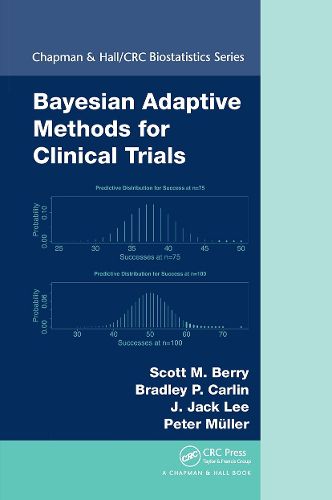Readings Newsletter
Become a Readings Member to make your shopping experience even easier.
Sign in or sign up for free!
You’re not far away from qualifying for FREE standard shipping within Australia
You’ve qualified for FREE standard shipping within Australia
The cart is loading…






Already popular in the analysis of medical device trials, adaptive Bayesian designs are increasingly being used in drug development for a wide variety of diseases and conditions, from Alzheimer's disease and multiple sclerosis to obesity, diabetes, hepatitis C, and HIV. Written by leading pioneers of Bayesian clinical trial designs, Bayesian Adaptive Methods for Clinical Trials explores the growing role of Bayesian thinking in the rapidly changing world of clinical trial analysis.
The book first summarizes the current state of clinical trial design and analysis and introduces the main ideas and potential benefits of a Bayesian alternative. It then gives an overview of basic Bayesian methodological and computational tools needed for Bayesian clinical trials. With a focus on Bayesian designs that achieve good power and Type I error, the next chapters present Bayesian tools useful in early (Phase I) and middle (Phase II) clinical trials as well as two recent Bayesian adaptive Phase II studies: the BATTLE and ISPY-2 trials. In the following chapter on late (Phase III) studies, the authors emphasize modern adaptive methods and seamless Phase II-III trials for maximizing information usage and minimizing trial duration. They also describe a case study of a recently approved medical device to treat atrial fibrillation. The concluding chapter covers key special topics, such as the proper use of historical data, equivalence studies, and subgroup analysis.
For readers involved in clinical trials research, this book significantly updates and expands their statistical toolkits. The authors provide many detailed examples drawing on real data sets. The R and WinBUGS codes used throughout are available on supporting websites.
Scott Berry talks about the book on the CRC Press YouTube Channel.
$9.00 standard shipping within Australia
FREE standard shipping within Australia for orders over $100.00
Express & International shipping calculated at checkout
Already popular in the analysis of medical device trials, adaptive Bayesian designs are increasingly being used in drug development for a wide variety of diseases and conditions, from Alzheimer's disease and multiple sclerosis to obesity, diabetes, hepatitis C, and HIV. Written by leading pioneers of Bayesian clinical trial designs, Bayesian Adaptive Methods for Clinical Trials explores the growing role of Bayesian thinking in the rapidly changing world of clinical trial analysis.
The book first summarizes the current state of clinical trial design and analysis and introduces the main ideas and potential benefits of a Bayesian alternative. It then gives an overview of basic Bayesian methodological and computational tools needed for Bayesian clinical trials. With a focus on Bayesian designs that achieve good power and Type I error, the next chapters present Bayesian tools useful in early (Phase I) and middle (Phase II) clinical trials as well as two recent Bayesian adaptive Phase II studies: the BATTLE and ISPY-2 trials. In the following chapter on late (Phase III) studies, the authors emphasize modern adaptive methods and seamless Phase II-III trials for maximizing information usage and minimizing trial duration. They also describe a case study of a recently approved medical device to treat atrial fibrillation. The concluding chapter covers key special topics, such as the proper use of historical data, equivalence studies, and subgroup analysis.
For readers involved in clinical trials research, this book significantly updates and expands their statistical toolkits. The authors provide many detailed examples drawing on real data sets. The R and WinBUGS codes used throughout are available on supporting websites.
Scott Berry talks about the book on the CRC Press YouTube Channel.